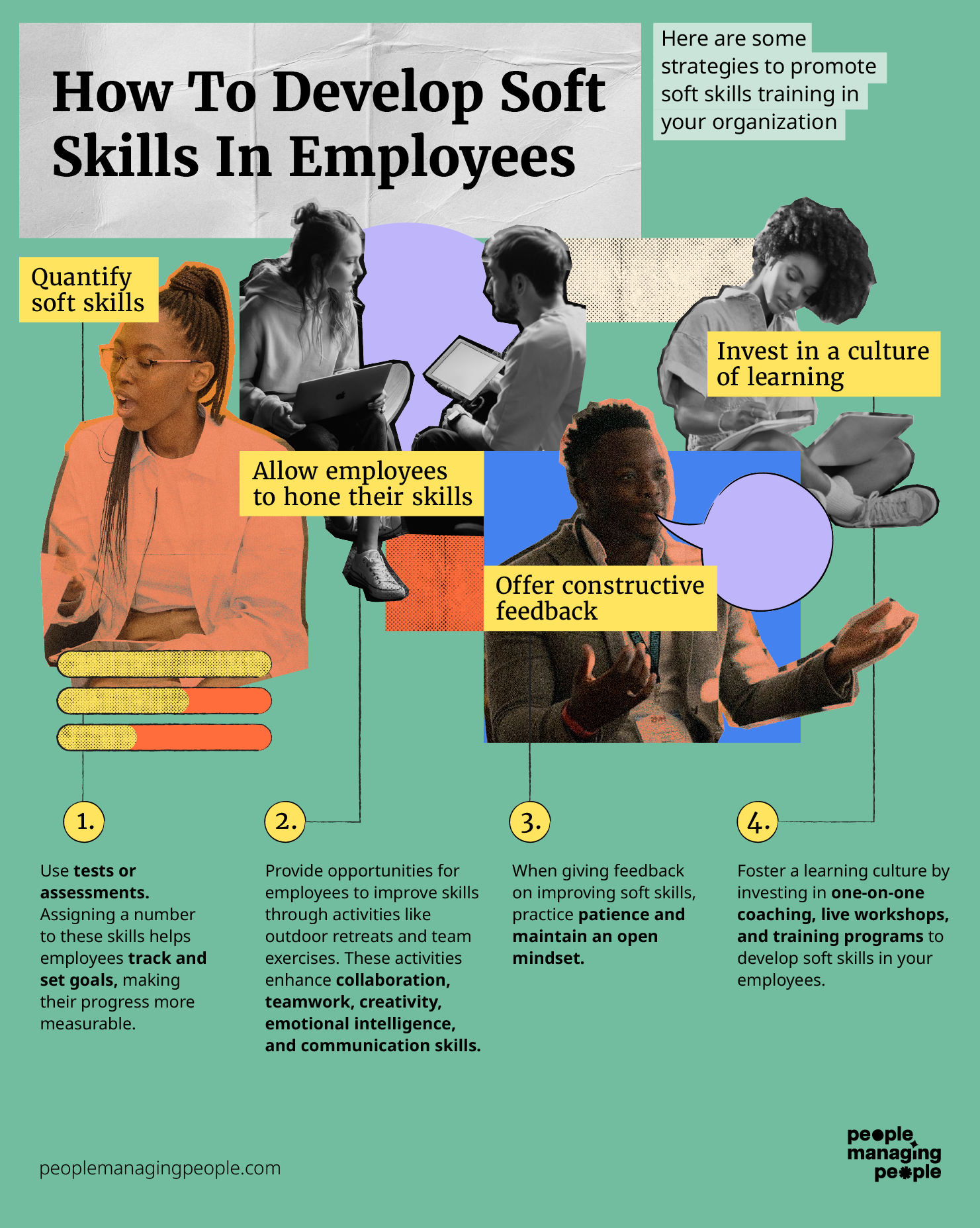Soft skills are what humans use to interact with one another, read other people, and emotionally navigate situations.
From customer service to marketing to managing people, many business interactions rely on soft skills. Being well-versed in soft skills can give a you a leg up, both as an employee and in the career marketplace.
In almost every industry, technology is disrupting how people work. The rise of AI in the workplace is automating routine, repetitive tasks that are more efficiently handled by computers, leaving more emphasis on 'soft-skill' work that is significantly harder, if not impossible, to automate.
Also known as people skills, these are the personal attributes of your emotional intelligence that enable you to play well with others.
As Deanna Pate of LinkedIn explains, soft skills are amongst the top skills required by companies.
Here we’ll go through what soft skills are, examples of soft skills, why they’re important, and how to develop your own.
What are soft skills?
Soft skills are personality traits and interpersonal skills like effective communication skills, time management skills, problem-solving skills, and listening skills.
Generally, skillsets are lumped into hard and soft skills, with hard skills describing more concrete technical skills and soft skills indicating ‘non-technical skills.’ While technical skills are still important in the job market, candidates that also have soft skills are more likely to perform well. That’s why employers prefer employees who already have soft skills.
The Future of Work 2021: Global Hiring Outlook report states that employers named soft skills like dependability, flexibility, and collaboration as their most preferred skills in an employee.
Soft skills make you employable and enable you to distinguish yourself from co-workers who might have similar qualifications and experience. Moreover, soft skills are also critical when navigating day-to-day business challenges like dealing with a dissatisfied client or negotiating with a supplier.
Examples of soft skills
So, what are the key soft skills employers value? The following soft skills examples are highly attractive to hiring managers—so don’t be shy about highlighting them in your interview question responses!
- Acceptance of criticism: being able to receive constructive criticism with an open mind
- Accountability: fulfill responsibilities, always follow through, and accept responsibility
- Active listening: the skill of paying close attention to what is being said and discussed
- Adaptability: the ability to be flexible and open to change for learning and growth
- Collaboration: being a ‘team player’ or effectively contributing to a diverse team
- Communication: the ability to effectively convey and receive information
- Conflict management: the ability to help groups and individuals mediate disagreements and arrive at positive outcomes
- Creativity: the ability to come up with new original ideas to solve issues and complete tasks
- Critical thinking skills: inquiry, resourcefulness, and creativity in problem-solving
- Decision-making: the ability to swiftly weigh pros and cons and take decisive action
- Dependability: being trustworthy and reliable
- Emotional awareness: possess empathy and tools for conflict resolution
- Leadership skills: lead, manage, and guide team members
- Persuasion: the capability to influence the behavior and beliefs of others
- Positive attitude: the inclination to approach challenges with optimism and find the “upside” in challenging situations.
- Problem-solving: achieving your goals by determining and overcoming obstacles
- Time management: consciously planning and splitting time among various tasks
- Work ethic: the ‘can do’ attitude and determination to work hard to achieve company goals
Why are soft skills important?
In 2013, Google conducted an internal study to find out which employees were most successful in terms of productivity and innovation.
Turns out, the top seven qualities of the company’s best-performing and most innovative employees were soft skills. In a bold move, Google reinvented how, and who, it hired, opening their positions up to candidates with non-technical degrees, like arts and humanities.
While technical skills connect workers to the physical function of their jobs, soft skills build an emotional connection between workers and their jobs, the company, and colleagues. This contributes to:
- An environment of belonging and purpose. In other words, your soft skills can help increase employee engagement throughout the organization—which can be tracked with an employee app’s real-time analytics dashboard. This is a factor that is known to impact business outcomes, like productivity, directly.
- Reduced burden on management. Employees with strong interpersonal skills need less hand-holding. Having great soft skills often means you have the confidence to be a self-starter and excellent collaborator. Managers will feel at ease delegating projects to you with little oversight, leaving them more time to dedicate to bigger projects.
- Better career outcomes. The more developed your soft skills, the more likely you are to form positive relationships with leadership, develop highly collaborative working relationships with co-workers, and work more effectively with customers and other stakeholders. This translates to more opportunities for career advancement down the line.
How to develop Your soft skills
A McKinsey survey reveals that millions of workers, especially in advanced economies, need to reskill. Soft skills are one of the most important skills required for a modern employee. The question is, how exactly do you develop your soft skills?
Most people generally default to thinking of training courses to cultivate personal skills, but most soft skills aren't so easily learned through a Udemy module. Here are some practical, concrete ways to challenge yourself and hone your soft skills.
1. Ask for feedback
Since soft skills are based on interpersonal interactions, there's no better way to improve them than to involve the people you interact with most. Get comfortable with asking for feedback from superiors.
When requesting feedback, it's helpful to define what you're seeking from the other party. Some people might feel uncomfortable offering feedback in case it's perceived as criticism. Pre-empt this discomfort by asking specific questions that:
- Focus on the future: "Would you like to see this done differently next time? How so?"
- Emphasize processes: "How do you think we could improve the way we collaborate on this next time?"
- Ask for examples: "I'd like to do that better next time, what's an example of a time you saw that done really well?"
- Lean into outcomes rather than personal critiques: "How do you think I could have improved the outcome in this situation?"
2. Contribute to a culture of learning
One-on-one performance coaching, live workshops, and training programs are great resources for developing soft skills.
Speaking to your manager or your company's HR department about investing in these opportunities for your team is one way you can help build a culture of learning. Another way is to pursue these resources independently and share key takeaways with your team.
If your workplace encourages or offers incentives for professional development, even better! Advocate for group soft skills training so the whole team can build and foster this skillset together, both during and after the workshop.
3. Attend networking events
Walking into a room full of strangers is a significant challenge for your emotional intelligence—after all, you're there to build professional relationships from scratch!
The great thing about networking events is that everyone is there to talk and be talked to. Take advantage! Use these occasions to get comfortable with asking people about their work, where they're experiencing friction in their professional lives, and get to know them on a personal level. These conversations not only build your confidence and interpersonal skills, but they can also lead to valuable career in-roads.
4. Take the lead
In every organization, there's bound to be opportunities to step in and step up when something doesn't go to plan. When you voluntarily lead the charge, the people around you take notice.
Exposing yourself to high-pressure or critical situations helps you polish your analytical, leadership, critical thinking, time management, and social skills. There's also something to be said about 'rising to the occasion'—and proving to yourself that you are capable of taking on tough challenges outside of your comfort zone.
5. Look for opportunities when things get tough
Every challenge requires a solution—and the creative thinking required to get there is a goldmine for personal development. Often, when teams are presented with unexpected demands or changes, there are individuals who take the avenue of resistance, which can manifest into complaints and adopting a negative attitude. This is a trap that has a toxic effect on the team dynamic.
Instead, look at these situations with a solution-oriented mindset. Ask yourself:
- What kinds of lessons, skills, or opportunities can my team and I gain from solving this problem?
- How can I contribute to solving this problem?
- Who can I seek buy-in from to make this solution happen?
- Which people, teams, and other resources can I leverage to solve this problem?
6. Practice mindfulness in your relationships
Some of the best examples of soft skills in action come from the interactions we have every day when we're not actively "working"—like socializing in the lunchroom, spending time with family, and visiting friends.
To use these opportunities to improve your soft skills, challenge yourself to focus on the people around you. Consider things like:
- Has everyone present had an equal opportunity to speak?
- Have you asked as many questions as you've answered?
- What are other people's body language signals telling you?
- Does the interaction feel comfortable and natural? If not, what are some things you can do or say to put others at ease?
By making these easy and actionable steps a normal part of your daily life, you'll quickly notice your relationships improving, your professional influence growing, and an increased comfort level with conflict and other challenges. It goes without saying that these benefits have myriad benefits—both inside and outside of the workplace.
How To Develop Soft Skills In Employees
We can all benefit from improving our own soft skills, but what if your objective is to improve this skill set within your team? Employers generally default to thinking of personalized training courses to cultivate their personal skills, but they aren’t the only options. You can implement other strategies to promote soft skills training in your organization, such as:

1. Quantify soft skills
One of the biggest challenges when thinking of soft skills is that, unlike hard skills, they’re intangible. However, you can find a way to quantify these skills with tests or good old performance assessments. Putting a number next to a soft skill gives employees a starting point and a goal, making their progress more tangible.
2. Invest in a culture of learning
One-on-one performance coaching, live workshops, and training programs can help cultivate soft skills in your employees.
3. Give your employees time and opportunity to hone their skill
Offer your employees time and space to practice and enhance their soft skills. For example, outdoor retreats and team activities allow them to hone skills like collaboration, teamwork, creativity, emotional intelligence, teamwork, and communication skills.
4. Offer constructive feedback
89% of HR leaders agree that ongoing feedback positively impacts their company. However, it’s also important to provide feedback the right way. When providing feedback on developing soft skills, be patient and open.
Soft Skills Are Future-Proof
Every day, more and more tasks are being automated using custom GPT applications and other machine-learning tools. However, there remains no substitute for human interaction and its power to drive productivity—and great soft skills are the key to unlocking that potential. If you want to future proof your career, soft skills are the way to go.
Join The Conversation
Want to exercise your soft skills with other ambitious professionals? Join the conversation in the People Managing People Community, a supportive community of HR and business leaders sharing knowledge and expertise to help you progress in your career and build better organizations.


